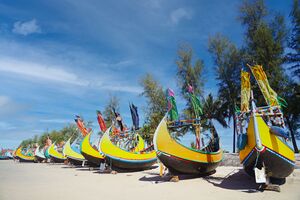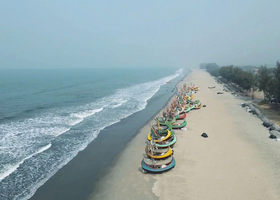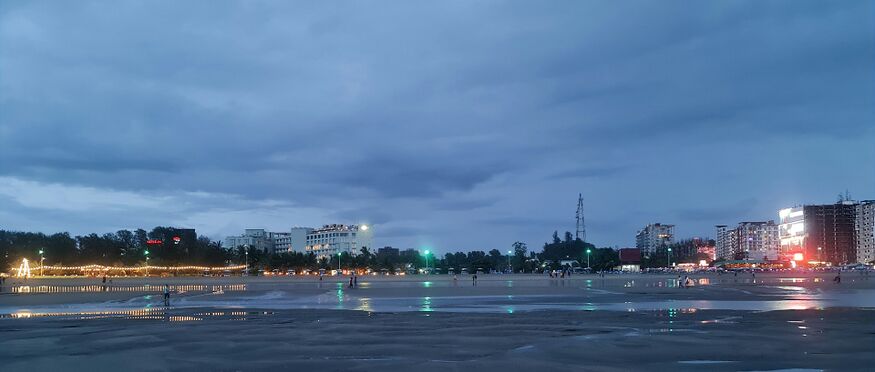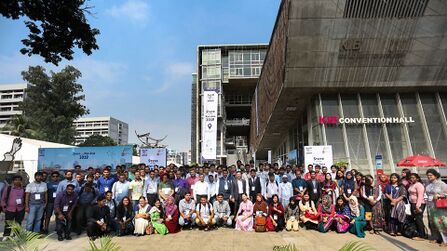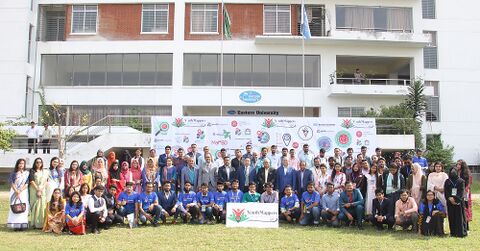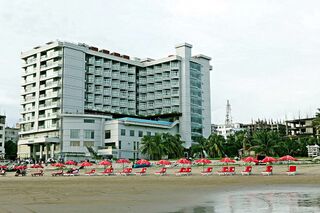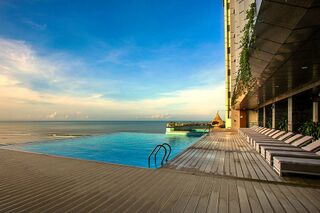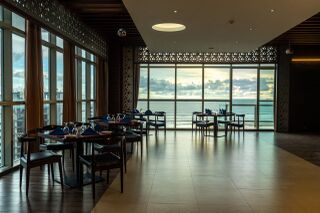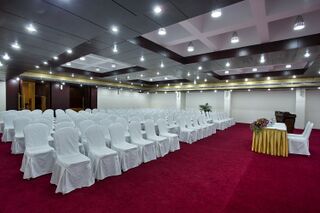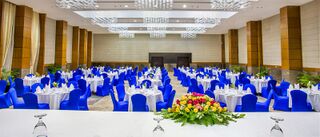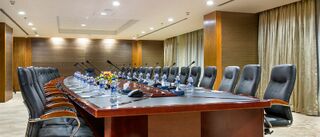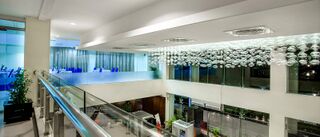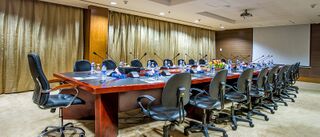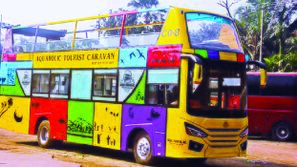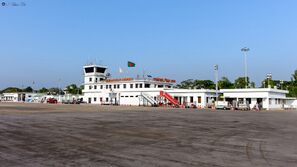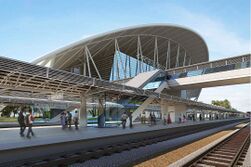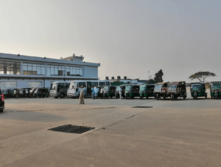State of the Map Asia 2024/Call for Venues/Bangladesh
Bid for SotM Asia 2024 in Cox’s Bazar, Bangladesh
Cox's Bazar, unquestionably the most renowned destination in Bangladesh, is famous for its stunning scenery and vibrant local culture. It not only serves as a venue but also offers an immersive experience that enriches the ambience and allure of events like State of the Map Asia. The serene and picturesque beach vista will serve as an optimal venue for an event focused on fostering connections and forging lasting memories. The unique geographical features of Cox's Bazar, including its coastal and marine ecosystems, make it an excellent subject for discussions on geospatial analysis and mapping. The inclusion of this relevance can enhance the conference's content by offering concrete illustrations of how geospatial technology can be utilized in coastal management, environmental conservation, and mitigating the risks of climate change-induced disasters. Due to its significance as a crucial location for environmental and humanitarian efforts, Cox's Bazar is already a central hub for numerous international NGOs and agencies. This is primarily due to the presence of one of the largest refugee camps globally and the area's susceptibility to climate-related challenges. By hosting an event like "State of the Map" here, we can take advantage of this attention to improve opportunities for creative solutions through the use of mapping and spatial analysis, as well as international collaboration. Overall, Cox's Bazar not only provides a scenic backdrop for State of the Map Bangladesh but also aligns closely with the thematic needs of the event, making it a strategic choice to foster engagement, discussion, and potential solutions for local and global challenges through geospatial technology. Whether you are a local resident or a visitor from afar, this event promises an enriching experience that showcases the best of what Cox's Bazar and Bangladesh have to offer.
Team
Describe your team here and answer the following questions: How many group members does the team have?
Organizer Groups
- Bangladesh Open Innovation Lab (BOIL)
- OpenStreetMap Bangladesh Community (OSMBD)
- YouthMappers Bangladesh Community (YMBD)
Core Steering Committee members
- Tasauf A Baki Billah (Ribin), Executive Director, Bangladesh Open Innovation Lab (BOIL)
- Sawan Shariar, President, OpenStreetMap Bangladesh (OSMBD) Executive Committee
- Atikur Rahman, Vice-President, OpenStreetMap Bangladesh (OSMBD)
- Shamsul Arafin, General Secretary, OpenStreetMap Bangladesh (OSMBD)
How are the team and the group members connected to OpenStreetMap? Are there members of the team who are OSM Foundation (OSMF) members or part of an OSMF Working Group?
- All the core steering committee members, i.e., Tasauf Ribin, Sawan Shariar, and Atikur Rahman, have been deeply involved with OpenStreetMap and its community ecosystem for almost a decade. All of them are members of OSMF and voting members of HOT. They have been core personnel for nurturing open mapping and community engagement through HOT, MissingMaps, and YouthMapers. The majority of the rest of the organizing committee members are core individuals from the YouthMappers chapters and the broader OSMBD community.
Do some of the group members have experience organizing a large conference?
- Most of the Steering Committee and Organizing Committee members were part of the organizing team of State of the Map Asia (SotMAsia) 2019 at Dhaka, which had almost 400 participants from 15+ countries, and the YouthMappers Bangladesh Summit 2023 at Dhaka, which had more than 120 participants. A couple of core steering committee members have been part of multiple SotMs and SotMAsias since 2017. Other than these, most of the steering committee and organizing committee members have experience organizing multiple large-scale periodic mapathons, trainings, and workshops within the community.
Contact email address:
- tasauf1980@gmail.com
- sshariar1991@gmail.com
- ask.bhoot@gmail.com
Venue
Reservation with a venue operator? Back-up venue?
- TBD. Already in contact with multiple vendors, the primary choices are Sayman Beach Resort, Ocean Paradise Hotel, and Best Western Heritage Hotel— three of the major venues for conferences at Cox’s Bazar with adequate facilities to support the event needs.
On which date(s) is the venue available?
- September, 2024
What is the capacity of the venue (how many visitors are allowed at the venue)?
- 400+
What is the size of the main auditorium?
- 300+
What is the size of the foyer?
- 100+
Are there spaces for breakout sessions?
- Yes, there will be common spaces
Is there wheelchair access?
- Yes
What are the facilities in the venue (e.g., A/V, electricity, tech, internet, power backup, air conditioning or not, toilet facilities, etc.)?
- Basic facilities are available in the venue
Nearby or on-site facilities in the venue (e.g., potential accommodations for participants (nearby or on-site), restaurants, etc.)?
- The venue is 500 meters from the central railway station, the central bus station, and 2 kilometres from the airport, in Cox’s Bazar. Maps show an abundance of accommodation options nearby at various levels of affordability, starting at less than USD 20.
Catering
In the past, we provided lunch and two coffee breaks, one in the morning and the other in the afternoon. What are the options for catering?
- The venue has its own restaurant and catering facility. The organizers will curate a suitable menu for the meals and the snack corner.
City
What infrastructure does the place have?
- Cox's Bazar has excellent infrastructure, including a good road network, rail connectivity, one of the busiest domestic airports (undergoing a massive expansion to be upgraded as an international airport soon), international standard hotel chains and resorts, hospitals and health facilities, etc. to support its status as a major tourist destination in the country and to improve living conditions for both residents and tourists.
Accessibility (PWD, bike lanes)
- Though no dedicated bike lanes are available in the city, the road traffic is quite safe for cyclists. The footpaths are quite spacious and friendly for PWD.
Communication (internet, local sim cards)
- Local SIM cards are available and easy to get.
Public transportation (how to access the venue by walking, car, bike, etc)
- The proposed venue is in the main hotel motel zone, making it within walking distance from any of the accommodations within the city. One can easily use the footpaths, beachways, and marine drives to get to the venue. The common and necessary local transportation options include CNG (tuk-tuks), rickshaws, and TomToms (electric buggies), which are particularly popular with tourists because of their accessibility and convenience. Bicycle and bike rental services are now also available in the city, but they are more to be used for exploring the picturesque marine drive and the different beaches throughout the coast.
Safety
Is it an LGBT-friendly space? Take note of OSMF's SotM safety policy.
- Bangladesh is a predominantly Muslim country, and as the religion doesn't approve, acceptance of gender neutrality is pretty low. Still, historically, the general population has been friendly and hospitable. As long as there aren’t any extreme showoffs or acts that might hurt the religious feelings of the people in general, suffice it to say people are welcome. Moreover, Cox’s Bazar is heavily crowded with tourists and huge numbers of foreign NGO workers; people are generally compassionate; and the area is pretty safe (especially the main hotel-motel zone).
What about medical and travel safety?
- There are an adequate number of health facilities available in Bangladesh, though the service standard in Cox’s Bazar might be questionable compared to those in the capital, Dhaka. Health safety index at 95/195.
What about terrorism or criminalism?
- Cox's Bazar presents itself as relatively safe for travellers. There is a good presence of security forces, particularly in areas of high tourism like the beach. Many of the hotels and restaurants cater to foreign tourists, so they maintain good safety standards. However, caution is always advised, especially at night. Also, cultural differences can affect the perception of safety, as it is a predominantly Muslim country, so it's important to dress modestly and follow local customs.
What will the season and weather look like on the targeted dates?
- September marks the end of monsoon season in Cox's Bazar, with a notable decrease in rainfall compared to previous months. The average relative humidity in September is 84%. With the onset of September, the average high temperature remains moderately hot, at 29.8°C (85.6°F). The nighttime temperature in September experiences a minor dip, averaging a still moderately hot 26.1°C (79°F).
Travel/Transportation
What are the modes of international transportation (air/rail/road)?
- Air is the best option. Though Cox’s Bazar Airport is not serving international flights yet, it is still a very busy airport with day-long flights to and from Dhaka International Airport, the major international airport in Bangladesh. One can easily book connecting flights after reaching Dhaka. It takes less than an hour’s flight to reach Cox’s Bazar. People reaching Dhaka at night might need to plan a layover until morning, as the flights are only operated in the daytime for Cox’s Bazar.
- One can also plan to travel by bus or train after reaching Dhaka. Both bus and train journeys are also compelling to tourists. It takes 12 hours (approximately) by bus and 9 hours by train to reach Cox’s Bazar.
Is there an international airport?
- Cox’s Bazar Airport is not serving international flights yet. But rapid expansion is ongoing to have it upgraded to an international airport soon.
What are the distances and modes of transportation from airports to cities or venues?
- The venue is within 5 km of the airport. People can take taxis, shuttle services, CNG (tuk-tuk), Tomtom (electric buggies), and rickshaws to get to the venue from the airport.
What kind of visa restrictions are there?
Visa on Arrival: To attract tourists and ensure a hassle-free arrival in this land of stories, the government of Bangladesh has decided to provide visas on arrival to foreign nationals, including those of Bangladeshi origin. Once you arrive in Bangladesh, after examining your necessary travel documents, the immigration authority at the airports and land ports will issue a Visa on Arrival for a maximum of 30 days to the citizens of the countries mentioned below under the following conditions:
(a) The nationals of those countries where there is no diplomatic mission of Bangladesh may be granted a visa on arrival after examining the genuineness of their visit;
(b) based on invitation letters In this case, interested or invited organizations must notify the immigration and passport authorities of the foreign visitor's arrival ahead of time.
(c) After inspection and approval by the immigration authority at the airports and land ports, citizens arriving from the USA, Canada, Australia, New Zealand, the Russian Federation, China, Japan, Singapore, Malaysia, South Korea, the UAE, Saudi Arabia (KSA), Qatar, Kuwait, Oman, Bahrain, and the countries of Europe may issue visas on arrival only for official duty, business, investment, and tourism;
(d) If any foreign national arrives in Bangladesh from a country other than his/her own country, where there is no mission of Bangladesh, he or she may be issued a visa on arrival;
All the rest will need to have visas obtained before visiting Bangladesh.
For more details on Bangladesh visa policies, see https://en.wikipedia.org/wiki/Visa_policy_of_Bangladesh
Visa policy snapshot on a map: https://commons.wikimedia.org/wiki/File:Visa_policy_of_Bangladesh.svg
How about the affordability of travel?
- The trip is pretty affordable. Participants can take a shuttle or taxi service to reach the venue by car. Public transportation is very economical, especially with the CNG (tuk-tuk), Tomtom (electric buggies), and rickshaws.
Dates
Is the venue available on the proper dates?
- Yes
Are there conflicts with other conferences (national/regional SotM, FOSS4G)?
- Yes, the event will be an extended part of State of the Map Bangladesh (SotMBD)
Are there conflicts with national festivals/activities (e.g., festivities, elections, holidays)?
- No
Do you have a rough idea of what timelines will look like (e.g., call for participation, sponsorship, scholarship, etc.)?
- Yes, we are preparing it in the working group
Other special features of the venue
Cox’s Bazar has been one of the most prominent hubs for humanitarian aid operations due to the presence of one of the largest refugee camps in the world for displaced Myanmar nationals (the Rohingya population). This will create an enormous opportunity for the experts & the community to learn from the stakeholders on the ground about how geospatial data & components are being used in a real operational scenario. This will also increase the opportunity for networking & collaboration.
See more: https://rohingyaresponse.org
Funding
The organizers are already developing the sponsorship deck and other documentation to reach out to the potential sponsors. The plans are to reach out to local and international partners and patrons to sponsor the event. The organizers are eyeing something around 45k - 50k to replenish the expenses for the event, which include the expenses associated with the venue, logistics, catering, souvenirs & promotional means, and scholarships (both local and international). To successfully host this event, the team will require some support and communication assistance from our global community stakeholders, OSMF, and HOT.
We await to welcome you to Cox’s Bazar—miles of golden sands, towering cliffs, surfing waves, rare conch shells, colourful pagodas, Buddhist temples, the tribes with their environmental wisdom and spirituality, delicious seafood, the longest unbroken sandy beach, and the tourist capital of beautiful Bangladesh!
